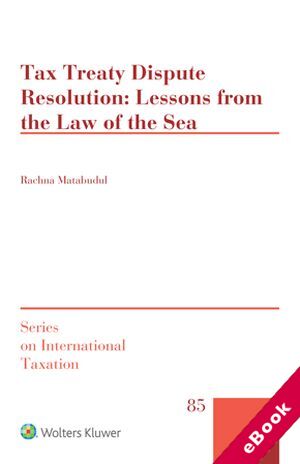
The device(s) you use to access the eBook content must be authorized with an Adobe ID before you download the product otherwise it will fail to register correctly.
For further information see https://www.wildy.com/ebook-formats
Once the order is confirmed an automated e-mail will be sent to you to allow you to download the eBook.
All eBooks are supplied firm sale and cannot be returned. If you believe there is a fault with your eBook then contact us on ebooks@wildy.com and we will help in resolving the issue. This does not affect your statutory rights.
Tax Treaty Dispute Resolution is a first-of-its-kind comparative study premised on certain vital geopolitical similarities that underpin the international tax regime (ITR) and the law of the sea regime while considering the differences in the institutional context of both regimes. Stakeholders in the international taxation community agree that existing dispute resolution processes need improvement, and a global consensus must be achieved. This book renders a potential restructuring of the tax treaty dispute resolution system based on a comparative analysis of the dispute resolution mechanisms under tax treaties, as prescribed in the OECD and UN models, on the one hand, and the UN Law of the Sea Convention (LOSC) on the other.
What’s in this book:
This trailblazing book puts forward a new tax treaty dispute resolution system based on the LOSC system for resolving multilateral tax disputes, focusing on the following:
The suggested restructuring of the tax treaty dispute resolution system expands the existing mutual agreement procedure. It shapes a comprehensive legal framework that aims to achieve a more effective, predictable and equitable resolution of multilateral tax disputes in the 21st-century ITR by finding the right balance between countries’ right to tax sovereignty and the rule of law.
How this will help you:
Just as the design of the dispute resolution system under the LOSC laid the groundwork for universal consensus of the Convention among almost 160 countries, the author’s new tax treaty dispute resolution system also offers a solid foundation for consensus-building towards a universal treaty in the ITR. All those concerned with international tax dispute resolution – whether policymakers, in-house counsel, national tax authority officials, judges, tax lawyers or academics – will find the truly valuable analysis here, not elsewhere.